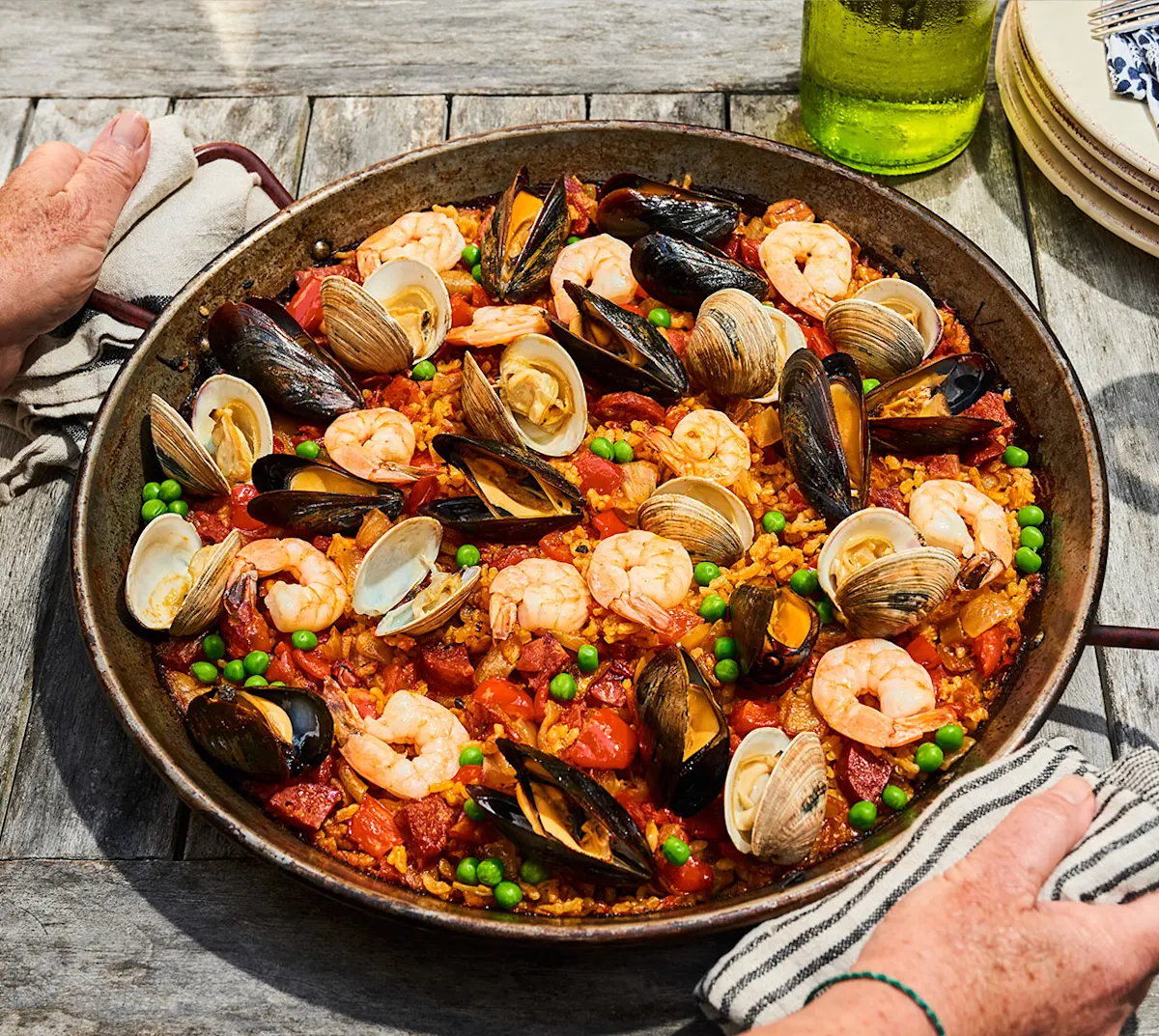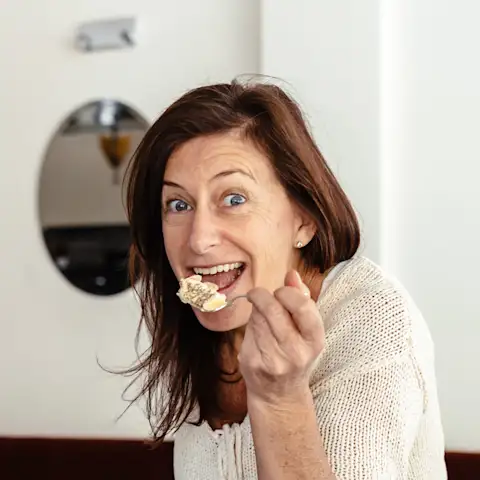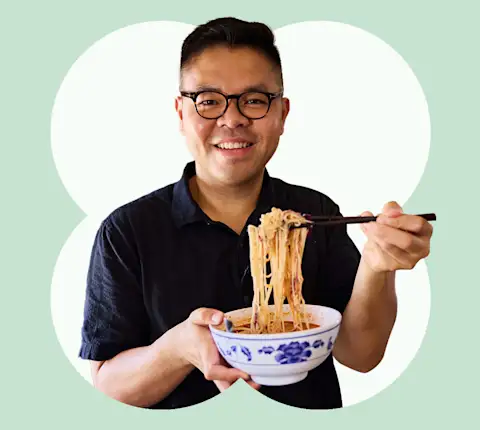I’ve been obsessed with paella since I secured my first paella recipe decades ago from a cozy Napa Valley Spanish tapas restaurant called Zuzu. Their version — presented in a single-serving cast-iron pan — was loaded with shellfish and baby back riblets and topped with a generous dollop of aioli. After making it once, I was hooked. Now paella is my go-to entertaining wonder.
Whenever I carry a paella pan to the table, people freak out; my paella has become that legendary. Back in the day, I’d prepare big batches of sofrito — an aromatic vegetable base of tomato, onion, garlic, bell pepper, saffron, and salt sautéed with olive oil then combined with chicken stock — and put extras in the freezer for future use. Zuzu’s sofrito recipe is a bit laborious, so this method saves prep time for future paellas. Then I’d brown and cook baby back ribs in the sofrito before adding them to my paella pan — yes, I bought a paella pan — along with Spanish bomba rice and diced Spanish chorizo. After some time in the oven, I’d top the dense, char-edged mélange with shellfish and green peas then cooked it some more.
Recently, I developed a new paella recipe with equally outstanding flavor and visual flair. Though it skips the baby back ribs, it’s so easy to make on the fly there’s no need to prep and freeze extra sofrito. Plus, you can include ribs if you wish; just separate and sear them in a pan to brown, simmer them in the sofrito-chicken broth mixture for about 20 minutes, and add them to the paella pan when you add the rice.
Although paella is traditionally cooked over an open flame, Zuzu taught me the benefits of cooking paella in the oven. It may be a rogue move, but it ensures that all of the ingredients cook evenly without having to move the pan around during cooking. If you’d rather go stovetop-style, the seafood will steam as the rice cooks and the liquid evaporates. Either way, remember not to stir the rice after you get everything simmering and on its way; you want the whole dish to settle long enough to form a crusty bottom.
4 tips for making great paella
1. Paella is all about the sofrito and the broth. The sofrito flavors the paella, so if you create your own sofrito, taste your base to make sure it’s well seasoned and robust. If it’s not, adjust the seasonings. If you want to make a traditional sofrito, consider that pure seafood paella usually starts with a seafood-based broth and “mixed” paella often uses a chicken-broth base.
2. The rice you choose matters. If you want your rice to be perfectly tender but never gummy, use the right rice, i.e. short-grain or medium-grain rice. Spanish Bomba and Calasparra rice are popular for paella. They’re not the same as arborio rice, which is Italian, but arborio is a great substitute.
3. Don’t worry about the pan as long as it’s oven-safe. Paella pans, which are wide and thin-bottomed, make for easy, even cooking. They also yield an expansive bottom crust. But cast-iron, stainless-steel, or other oven-safe pans work too, so don’t feel like you need to buy a special paella pan to make this dish.
4. The secrets to the crusty, caramelized-rice bottom, called “socarrat,” are the heat and the liquid amount. Paella pros judge the quality of a paella by its socarrat because the crust adds varied texture and even more flavor. To achieve a respectable crust, place the bottom of your paella close to the heat source, so on the lowest rack in the oven or over good heat on the stovetop. Excess liquid, be it from sofrito or juice from vegetable additions like onions, can impede socarrat formation, so be mindful of what you add to the pan.
Easy Seafood Paella
This paella is festive and easy to prepare, which makes it fair game for special occasions and weeknight dinners alike. When the paella comes out of the oven, serve as is, or for a more stylistic approach, fluff a bit of the top rice without disrupting the bottom crust to create more texture and less flat uniformity.
Serves 4 to 6
3 Tbsp olive oil
4 garlic cloves, minced or pressed
1 yellow onion, chopped
1 red bell pepper, chopped
1/2 tsp saffron threads
1 tsp smoked paprika
1 ½ cups short-grain Spanish paella rice, usually labeled as bomba or paella rice
1 cup (8 oz) canned fire-roasted or other diced tomatoes
2¾ cups chicken broth
3 oz dried hard Spanish chorizo sausage, roughly chopped or sliced ¼-inch-thick
2 tsp kosher salt
Freshly ground pepper
12 clams, scrubbed
12 mussels, scrubbed
12 jumbo shrimp, peeled and deveined1/2 cup frozen peas
Lemon wedges for garnish, optional
Instructions:
Place an oven rack in the lowest position in the oven. Preheat the oven to 450°F.
Heat the olive oil in a large paella pan over medium heat. Add the garlic, onion, bell pepper, saffron, and smoked paprika. Cook, stirring frequently, until soft, about 10 minutes. Add the rice and stir until coated and shiny.
Stir in the tomatoes, chicken broth, and chorizo, then add salt and pepper to taste. Evenly spread the ingredients with a spoon and let simmer for 5 minutes.
Without stirring, carefully transfer the pan to the oven and roast on the lowest rack for 15 minutes. Add the clams and mussels on top. Roast for another 5 minutes, then scatter the shrimp and peas over the top. Roast until the shrimp are just cooked through and the clams and mussels have opened, about 10 more minutes.
Serve with lemon wedges.
Photo credit: Erin Ng






